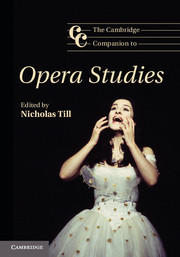Book contents
3 - The operatic event: opera houses and opera audiences
from Part One - Institutions
Published online by Cambridge University Press: 05 December 2012
Summary
In 1778 the Italian journalist and historian Pietro Verri, noting the frequent complaints by critics from northern Europe about the lack of dramatic coherence in Italian operas, wrote ‘In my opinion, northerners are wrong to criticise our opera with the laws of the theatre;…ours are a spectacle of another sort.’ In this chapter I want to examine what Verri may have meant by ‘spectacle of another sort’, and to suggest that any operatic performance might usefully be understood as a ‘spectacle of another sort’.
In Chapter 10 I suggest that an operatic text should perhaps be seen as the pretext for a performance, rather than the performance serving to realize the operatic ‘work’. But we also have to recognize that performances themselves serve as pretexts for events. Reinhard Strohm has suggested that baroque opera in particular must be understood as primarily ‘event-like’ rather than ‘work constituted’, but Carolyn Abbate insists that this is true for all operatic performance: ‘what counts is not a work, not, for example, Richard Wagner’s Die Meistersinger von Nürnberg in the abstract, but a material, present event’. Although modern cultural activities are often work focused (I attend a performance of Hindemith’s Mathis der Maler because I want an opportunity to experience an infrequently performed opera, not to hear the particular singers or to be seen at the Royal Opera House), even today this is far from being exclusively the case: many people attend performances because they are more interested in singer x, conductor y or director z than in the work being performed. And people also attend theatrical or musical performances as a social activity: to celebrate an event in their lives; as the occasion for a date; to identify themselves as part of a particular community; to participate in a social or political ritual.
- Type
- Chapter
- Information
- The Cambridge Companion to Opera Studies , pp. 70 - 92Publisher: Cambridge University PressPrint publication year: 2012
References
- 10
- Cited by



